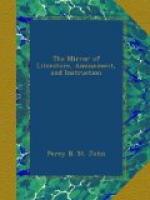From the insignificant reed flows the sweetest of juices;—from the bending vine springs the most delightful drink of the earth.
* * * * *
THE SKETCH-BOOK.
THE BATTLE OF NAVARINO.—BY AN OFFICER ENGAGED.
(Abridged from No. 2, of the United Service Journal.)
We had been cruizing off the coast of the Morea, for the protection of trading vessels, and to watch the motions of the numerous Greek pirates infesting the narrow seas and adjacent islands. For fourteen months we had been thus actively employed, when the arrival of the Albion and Genoa, from Lisbon, hinted to us, that some coercive measures were about to be used against the Turks, to cause them to discontinue the exterminating war they carried on against the Greeks, and to evacuate the country pursuant to the terms of the treaty of July, 1827. The prospect of a collision with the Turkish fleet appeared to be very agreeable to the ship’s crew, as they had got a little tired of their long confinement on board, and anxiously looked for a speedy return to Malta to get ashore, which they had not been able to do for upwards of a year. We again proceeded on our protecting duty, and parted company with the admiral in the Asia. In about six weeks we returned, and found that many other British vessels had joined the Asia, whilst the squadrons of France and Russia added to the number of the fleet, which altogether presented an imposing attitude.
The Turkish and Egyptian fleets had arrived from the unsuccessful attempt in the Gulf of Patras some time before, and lay off the Bay of Navarino, before they finally entered and took up a position within the harbour. While the Ottoman fleet lay off the bay, the Turkish troops were said to have committed many unjustifiable outrages on the defenceless inhabitants of the country adjacent to Navarino; information of these oppressive acts was conveyed to the British admiral, and, it is believed, formed the grounds of a strong remonstrance on his part, addressed to the Turkish commanders, which hastened the collision between the two armaments. These facts were generally known throughout the fleet, and a “row” was eagerly expected.
About the beginning of October we had returned from our cruize; the men, ever since we had been in commission, had been daily exercised at the guns, and, by firing at marks, they had much improved in their practice.
Before entering the bay, the Ottoman fleet lay at the distance of ten or twelve miles from the Allies. They appeared numerous, with many small craft. Most of them bore the crimson flag flying at their peak, and on coming closer, a crescent and sword were visible on the flags. Their ships looked well, and in tolerable order: the Egyptians were evidently superior to the Turks.
Little communication took place between the Allied and Turkish fleets. The Dartmouth had gone into the bay twice, bearing the terms proposed by the allied commanders to Ibrahim Pacha. No satisfactory answer had been returned by the Ottoman admiral, whose conduct appeared evasive and trifling, implying a contempt for our prowess, and daring us to do our worst.




